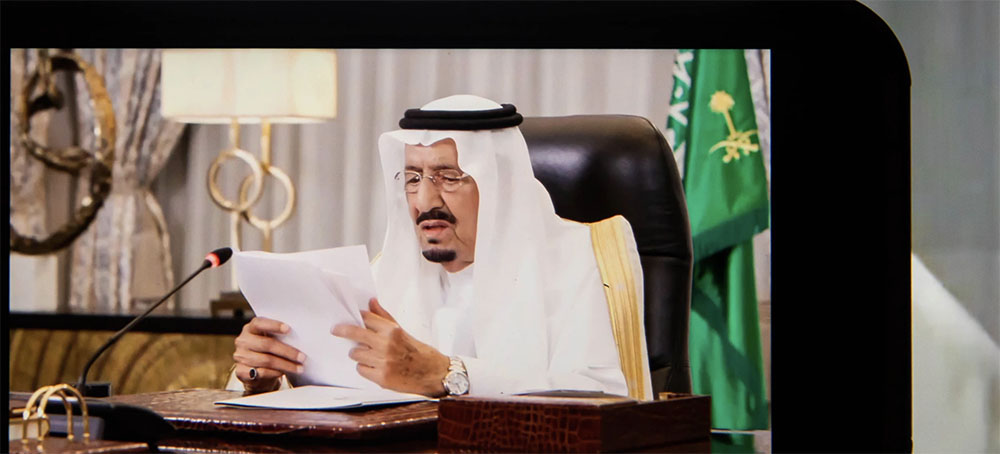Live on the homepage now!
Reader Supported News
“High gas prices will almost certainly be blamed on the party in power, so it really seems like the Saudis are using the oil weapon against Democrats here.”
The Saudi readout uses similar language. “Regarding energy and oil markets, the Custodian of the Two Holy Mosques [Salman] stressed the importance of maintaining balance and stability in the oil markets,” it says. But it adds a key detail not mentioned in the White House’s version. The Saudi version says King Salman “highlight[ed] the role of the historic OPEC Plus agreement … and the importance of maintaining the agreement.”
Experts say that pointing to the Organization of the Petroleum Exporting Countries’ agreement — the arrangement by which oil-producing member countries set oil prices, and over which Saudi Arabia exerts major influence as the largest oil producer — is a signal that the kingdom again declined to increase production. Shortly after the call, the International Energy Agency attributed soaring gas prices to Saudi Arabia’s “chronic” refusal to increase production.
“My read of the difference is basically that what happened is that the White House pressed for OPEC/OPEC+ and/or Saudi Arabia to increase oil production,” Ellen Wald, senior fellow at the Atlantic Council, told The Intercept in an email. “Saudi Arabia’s response was that it is operating within the confines of its commitments to OPEC+. … I also don’t see Saudi Arabia pushing to renegotiate the deal to allow for greater production increases.”
As a result, high gas prices could persist into the midterm elections, where they have historically had an acute influence on voter behavior. Perhaps the most infamous example of this was during the 1979 oil crisis, when following the Iranian revolution, oil production slumped, sending gas prices skyrocketing. President Jimmy Carter, keenly aware of the effect of high gas prices on his reelection prospects, called the collapse in oil production “the moral equivalent of war.” (Carter would not win reelection.) Previously in the 1970s, Gulf countries, including Saudi Arabia, restricted oil exports as a political weapon in a contest against Israel.
“Saudi Arabia has historically played a vital role in ensuring global energy markets are well supplied to support strong and resilient economies,” an administration spokesperson told The Intercept. “The President noted that it is especially important now, during this time of geopolitical instability and global recovery.”
Even if the Saudis are genuinely concerned about adhering to OPEC Plus, there are other ways they could bring down oil prices but are refusing to do so, experts say. “[OPEC Plus is] not an issue,” Samir Madani, a Saudi oil analyst and co-founder of Tanker Trackers, told The Intercept. “The Saudis can make or break the oil market simply by deciding what to ship out to the U.S.” Without even touching production levels, the kingdom could simply choose to export larger quantities of oil that has already been produced to the U.S., Madani explained.
As it stands, gas prices are at their highest level in seven years. The issue has become such an acute concern to Democrats that White House and top Democratic lawmakers are reportedly considering a federal gas tax holiday. Despite the obvious concerns, Biden has largely avoided blaming Saudi Arabia publicly, but in October, he alluded to his refusal to meet directly with Crown Prince Mohammed bin Salman as connected to the refusal to pump more oil. “There’s a lot of Middle Eastern folks who want to talk to me. I’m not sure I’m going to talk to them,” Biden said at a CNN town hall. It’s no secret that MBS favored the Trump administration, having claimed to have Trump’s son-in-law and top aide Jared Kushner “in his pocket.” When President Donald Trump requested an increase in oil production just prior to the 2018 midterm elections and later to decrease oil production to protect the domestic shale industry, MBS complied.
In private, however, the frustration is evident. “High gas prices will almost certainly be blamed on the party in power, so it really seems like the Saudis are using the oil weapon against Democrats here,” a senior Democratic congressional staffer told The Intercept on the condition of anonymity, lacking authorization to speak publicly. “Given the enormous support the Biden administration has given the Saudis, breaking a key campaign commitment to reassess the relationship, you’d expect them to be more helpful.” The official went as far as characterizing the Saudis’ refusal to boost production as “economic sanctions” on the U.S.
Several days prior to Biden and King Salman’s call, Jared Kushner traveled to the Middle East, meeting with MBS and other top Saudi officials, including the CEO of Aramco, at the state oil company’s headquarters in Dhahran. It is not known what they discussed. Asked about the purpose of the meetings, neither Kushner nor his firm, Kushner Companies, responded to requests for comment.
If the refusal to increase oil exports is politically motivated, it’s unclear what the solution might be, short of quitting our fossil fuel habit. “The answer ultimately is, ultimately meaning the next three or four years, is investing in renewable energy,” Biden said at the October CNN town hall.
Trita Parsi, executive vice president of the Quincy Institute, said that the conflict underscores the importance of lifting sanctions on Iran — another major oil producer that Biden could work with to elide Riyadh’s refusal to boost oil exports.
“A major benefit of the JCPOA [Iran nuclear deal] is that it can help reduce American dependence on and vulnerability against Saudi Arabia and the UAE,” Parsi said. “Saudi Arabia will have less ability to hurt the U.S. with its oil weapon if Iranian oil is back in the markets.”
Follow us on facebook and twitter!
PO Box 2043 / Citrus Heights, CA 95611



No comments:
Post a Comment
Note: Only a member of this blog may post a comment.